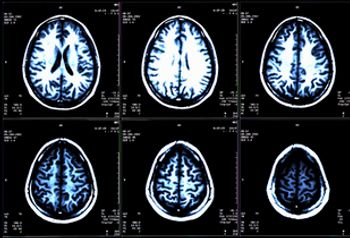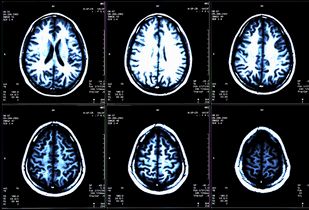
Multiple Sclerosis
Latest News

Latest Videos

More News

The brain shrinkage that occurs in patients with multiple sclerosis may be the result of a specific brain cell: When projection neurons are damaged, the brain shrinks.

Encouraging patient adherence to medication is very important to managing the cost of multiple sclerosis (MS) therapies, said Patty Taddei-Allen, PharmD, MBA, BCACP, BCGP, director, outcomes research, WelldyneRx.


Since multiple sclerosis is a chronic disease with no cure or control, the role of a caregiver or care partner is very important, said June Halper, MSN, APN-C, MSCN, FAAN, chief executive officer, Consortium of Multiple Sclerosis Centers.

The likelihood of patients with multiple sclerosis (MS) maintaining their employment status in 2 years can be predicted by their levels of physical disability and executive functioning, but not by other measures of cognition, according to new study findings.

The Consortium of Multiple Sclerosis Centers (CMSC) is teaming up with the Foundation of the CMSC and EMD Serono to launch a new Mental Health Mini Mentorship Program this summer.

The cause of multiple sclerosis is not well understood. In fact, it’s not understood at all, explained June Halper, MSN, APN-C, MSCN, FAAN, chief executive officer, Consortium of Multiple Sclerosis Centers.

Patients with obesity not only have a higher risk of pediatric multiple sclerosis (MS), but they also do not respond as well to first-line medications.

A new study suggests lipid profiles could help improve multiple sclerosis (MS) fatigue.

June Halper on Challenges With Identifying Which Multiple Sclerosis Treatments Have the Most Promise
Identifying which treatments for multiple sclerosis have the most promise is challenging because there are no head-to-head studies comparing treatments and what's promising for one clinician is different than what's promising for another clinician, explained June Halper, MSN, APN-C, MSCN, FAAN, chief executive officer, Consortium of Multiple Sclerosis Centers.

There are a lot of factors that should be considered when choosing a therapy for a patient with multiple sclerosis, including the patient profile, the patient’s lifestyle, and the efficacy of the therapy, said Mark Freedman, MD, MSc, professor of medicine in neurology at the University of Ottawa, director of the Multiple Sclerosis Research Unit, at Ottawa Hospital-General Campus, and senior scientists in the neuroscience program at Ottawa Hospital Research Institute.

Two abstracts presented at the American Academy of Neurology 2019 Annual Meeting evaluated misdiagnosis of multiple sclerosis.

Regardless of their level of disabilty, patients with multiple sclerosis face a substantial financial burden.

Patients with pediatric-onset multiple sclerosis (MS) not only have lower cognitive scores in adulthood than patients with adult-onset MS, but cognitive scores declined faster.

The biggest clinical challenges that we have in treating multiple sclerosis are 2-fold, explained June Halper, MSN, APN-C, MSCN, FAAN, chief executive officer, Consortium of Multiple Sclerosis Centers.

Obesity could exacerbate inflammation and worsen clinical disability in patients with relapsing-remitting multiple sclerosis.

Alemtuzumab improved clinical and magnetic resonance imagining outcomes in patients with relapsing-remitting multiple sclerosis across varying age groups and maintained efficacy through year 8 of follow up.

Both the FDA and the European Medicines Agency (EMA) have accepted applications to review ozanimod, an oral sphingosine 1-phosphate receptor modulator, for the treatment of relapsing forms of multiple sclerosis (MS).

Two abstracts presented at the 33rd Annual Meeting of the Consortium of Multiple Sclerosis Centers analyzed biomarkers to predict progression, disease severity, and cognitive impairment in multiple sclerosis (MS).

Arbaclofen extended-release tablets were found to be a safe treatment that reduced spasticity in patients with multiple sclerosis.

Patients with multiple sclerosis who received natalizumab therapy had lower relapse rates and reduced inflammation.

Long-term use of ozanimod may be associated with improved cognitive speed and higher rates of no evidence of disease activity among patients with relapsing multiple sclerosis (MS), according to 2 new abstracts presented at the 33rd Annual Meeting of the Consortium of Multiple Sclerosis Centers.

Patients who switched from ozanimod HCI 0.5 mg or interferon β-1a to ozanimod HCI 1.0 mg in an open-label extension study experienced sustained reduction in their annualized relapse rate. Patients who continued on with the 1.0 mg dose also experienced a sustained reduction.

Evobrutinib, an oral Bruton’s tyrosine kinase inhibitor, reduced gadolinium-enhancing lesions in patients with multiple sclerosis.

According to new research published in PNAS, researchers have determined that a molecule that helps blood clot may also play a role in multiple sclerosis (MS) relapses, in addition to discovering a new way of studying the disease in mice that more closely resembles the human form.

















